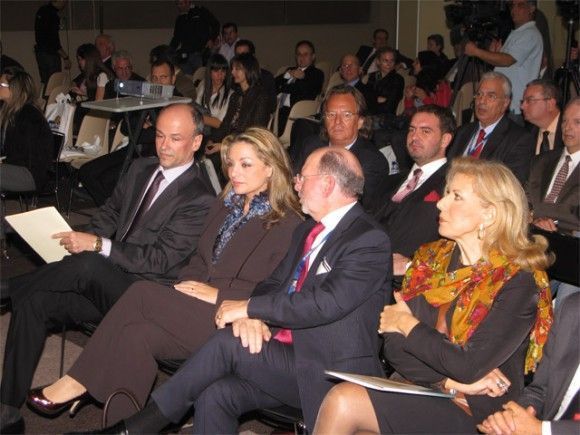Athens Hotel Industry In Free Fall

Athens-Attica Hoteliers Association President Yiannis Retsos; Culture and Tourism Deputy Minister Angela Gerekou; President of Xenia Exhibitions-Conferences Tassos Koumanis; and Athens-Piraeus super-prefect Constantina Bay.
Athens hotel bookings have been in “free fall” as of December 2008, which translates to a 12 percent decrease up until September 2009 and an eight percent drop in the average price per room, stressed the President of the Athens-Attica Hotel Association Yiannis Retsos at the association’s 40th Annual General Assembly.
In regards to the year as a whole, Mr. Retsos expressed his hope that the revenue drop would not exceed the “psychological barrier” of 20 percent.
The association’s president underlined that 2010 forecasts see difficulties for tourism and referred to the urgency of a partnership between the public and private sector for coordinated actions to support the capital’s tourism and brand name.
He also called for the settling of the GNTO debts to international networks as they “overshadow any chance of advanced marketing strategies and specialized promotion of Greek destinations.”
During his speech, Mr. Retsos once again highlighted the issues that stand as obstacles for the Greek capital’s tourism development.
“It is highly unfortunate that for the sixth year we are forced once again through our annual general assembly to request the creation of a Metropolitan Conference Center in Athens and the lifting of cabotage to promote cruise tourism,” he said.
Mr. Retsos also expressed the need of a targeted promotion of the city’s brand name to distinguish it as a conference and city break destination.
“As of August 2007 we entered the worst economic crisis of the past 100 years… Up to (last) September and, according to official data, the reduction in revenue for Greek tourism added up to 16 percent and the actual damage of hotel owners reached one billion euros throughout Greece,” the association’s president said.
“For the same period the hotels in Attica saw a 19 percent reduction in revenues, which exceeded the country’s average by far,” he stressed.
Mr. Retsos added that Athens, like any other European city, counts on conferences, organized events and incentives.
“All these areas have been affected by the crisis and will continue to be affected in 2010,” he said.
The president added that the tragic events of December 2008 have intensified the sense of insecurity among visitors and have created a bad image for Athens, which resulted to a disastrous first quarter of 2009 for the city’s hotels.
In addition, Mr. Retsos commented on tourism policy issues and described the 14 measures announced in December 2008 to support Greek tourism as “a positive action, although Athens benefited from them the least.”
During the general assembly of the Athens-Attica hoteliers, the results of the association’s fifth study on Attica hotel progress and the level of customer satisfaction for hotels of Attica were presented.
The 40th Annual General Assembly of the Athens-Attica Hotel Association took place prior to the inauguration of the 41st Xenia International Tourism Industry Exhibition, held on 27-30 November 2009, at the new exhibition center Metropolitan Expo.




